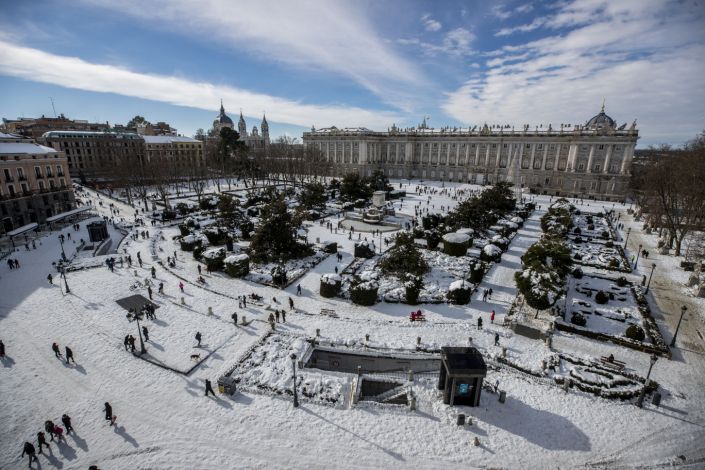
The Spanish capital of Madrid was all the while attempting to financially recover Monday following a 50-year record snowfall that deadened huge pieces of focal Spain and hampered the conveyance of Covid immunizations.
The snowstorm unloaded more than 50 centimeters of snow in certain regions and a virus front was transforming hills of cushioned white into sheets of ice and crusted floats. At any rate 700 streets were as yet not satisfactory enough, half of them unsuitable for driving without chains.
Temperatures were required to drop to short 11 degrees Celsius in an enormous wrap of the nation later Monday, as per the public AEMET climate office, provoking specialists to ask individuals to practice alert.
“We have some very complicated days ahead until the cold snap subsides,” Interior Minister Fernando Grande-Marlaska said. “It is necessary to postpone any movement that is avoidable, for safety and in order to not interrupt the works in the road network.”
Another group of 350,000 dosages of the Pfizer-BioNTech Covid immunization showed up at about six Spanish air terminals on Monday, however the portions bound for Madrid must be redirected toward the northern city of Vitoria. Specialists said that police escorts would assist the immunizations with getting the snow-stopped up roads and thruways.
After postponements over New Year’s, wellbeing experts in Spain were wanting to accelerate immunization cross country this week. Simply over half of the almost 750,000 portions got by Spain had been given out by Monday, as indicated by the Health Ministry. Medical care laborers got immunization shots in Madrid on Monday in spite of the gigantic snow cleanup.
The nation’s top Covid master, Fernando Simón, said that he anticipated that the tempest’s fallout should affect inoculation plans “in some specific areas,” however that in general most dosages should in any case be controlled in light of the fact that the need currently remains inhabitants in nursing homes and clinical laborers.
Tempest Filomena left four individuals dead and dropped snow that caught more than 1,500 individuals in their vehicles, some of them for as long as 24 hours. It has since moved east.
In Madrid, common assurance and military legions, supported by snowplows and tractors, figured out how to clear paths for ambulances and crisis vehicles. All things considered, a significant part of the city’s administrations stayed shut on Monday, including the principle discount market, albeit a few stores and newspaper kiosks opened without precedent for three days. Schools were shut for the week.
Occupants, some with crampons and climbing sticks, carefully advanced on frigid snow to metro stations, the solitary practical approach to drive to work. However, that lead to congestion in train vehicles where keeping social distance was incomprehensible. Passenger trains in Madrid and the fast railroad among Barcelona and Madrid were continuing later Monday.
The Spanish capital’s air terminal, which had been shut since Friday night, saw twelve flights take off or land on Monday.
The moderate re-visitation of routineness came as a help to Alba Martínez, a medical attendant who burned through six movements short an intermittent snooze working at a crisis ward during the snowstorm.
The 30-hour-long snowstorm obstructed her associates from arriving at their northern Madrid locale emergency clinic. Martínez was possibly supplanted on Sunday evening when a volunteer 4×4 vehicle brought fortifications and sent her home.
“The staff self-organized on messaging apps to figure out how to change shifts. But we feared running out of certain food that some patients needed,” she related, adding that the circumstance in serious consideration units with COVID-19 patients was considerably more hard for her associates.
Martínez asked why specialists didn’t load up on provisions and spot staff in close by inns before the tempest.
“The logical thing would have been to anticipate the situation, because all the warnings were there. But they didn’t,” she said.

James was born in Tuskegee Albama and educated at Kent state University. He has written across the National News. He worked as a manager for the global marketing department.
Disclaimer: The views, suggestions, and opinions expressed here are the sole responsibility of the experts. No journalist was involved in the writing and production of this article.

